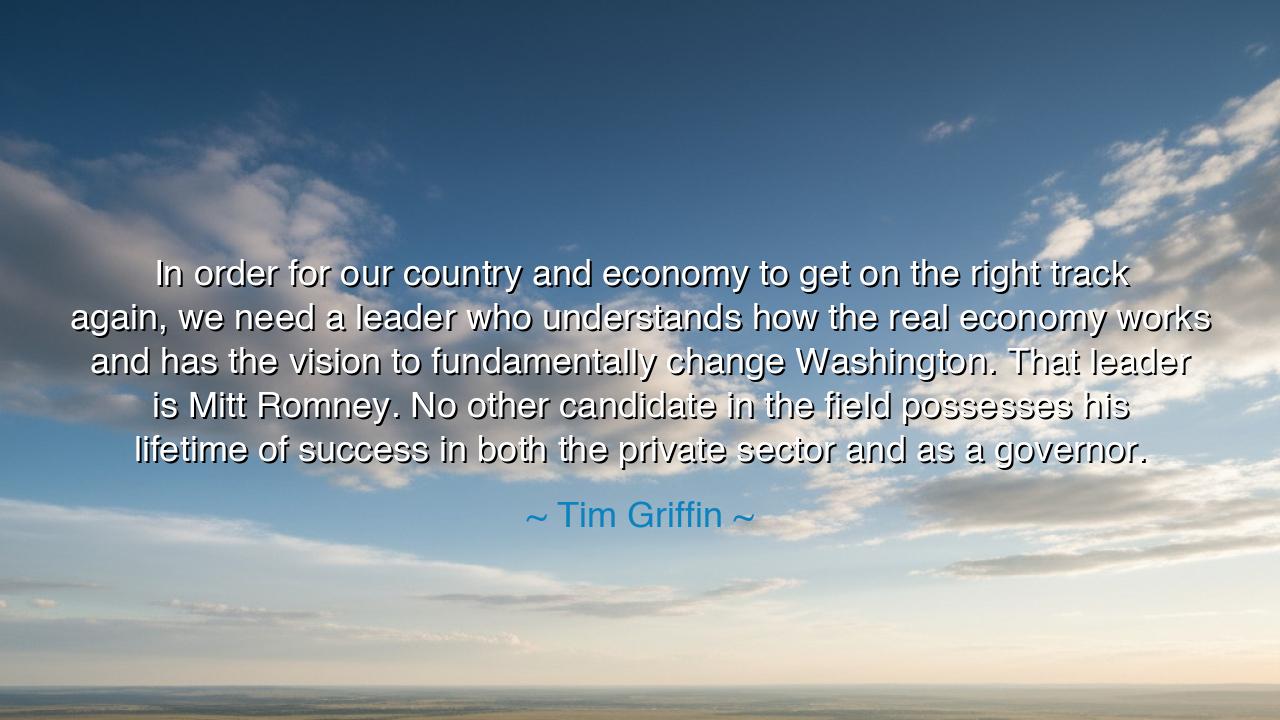
In order for our country and economy to get on the right track
In order for our country and economy to get on the right track again, we need a leader who understands how the real economy works and has the vision to fundamentally change Washington. That leader is Mitt Romney. No other candidate in the field possesses his lifetime of success in both the private sector and as a governor.






Tim Griffin once declared with conviction: “In order for our country and economy to get on the right track again, we need a leader who understands how the real economy works and has the vision to fundamentally change Washington. That leader is Mitt Romney. No other candidate in the field possesses his lifetime of success in both the private sector and as a governor.” These words, though tied to a moment in America’s political struggles, speak to a truth as old as nations themselves: that the fate of a people rests not merely in wealth or armies, but in the wisdom and character of its leaders.
The ancients often wrote of this same dilemma. Plato in his Republic spoke of the philosopher-king, the one who combines practical understanding with vision of the good. Rome too thrived or faltered depending on its leaders—when guided by men of discipline and foresight, the empire expanded and flourished; but when handed over to the corrupt and short-sighted, it staggered into decline. Griffin’s words echo this timeless recognition: the country cannot rise above the strength or weakness of those entrusted with its destiny.
When Griffin praised Romney’s lifetime of success, he emphasized two pillars of leadership: knowledge of the real economy and the experience of governance. For a ruler who only knows theory cannot command the markets, and one who only knows profit cannot understand the burdens of the people. The balance of private achievement with public service has always been a rare thing. Consider Cincinnatus, the Roman farmer-general who returned from victory to his plow, combining both practical labor and the vision of civic duty. The marriage of worldly skill with political wisdom has always been the mark of those who can bring a nation back to strength.
History offers both proof and warning. In the aftermath of the Great Depression, it was Franklin D. Roosevelt who carried both vision and practical reforms that restored America’s faith and economy. He combined bold experimentation with deep empathy for the struggles of ordinary people. But in other times, when leaders sought only self-interest, nations were left to ruin—like the later emperors of Rome who knew nothing of the real economy and squandered their inheritance in vanity. The thread is clear: a leader must be more than a title; he must be a steward of both wealth and spirit.
The meaning of Griffin’s quote is more than mere endorsement. It is a reflection on the kind of vision a nation requires in times of uncertainty. When storms rage and systems falter, technical skill alone cannot heal a people. What is needed is both practical wisdom—the ability to understand the real economy, the day-to-day struggles of merchants, workers, and families—and transformative vision, the courage to see beyond what is and shape what could be. Without this union, no change can be lasting.
The lesson for us, then, is not bound to one man or one election, but universal: when choosing leaders, in any age or land, we must look not only at their words but at their record, their discipline, their ability to balance success with service. And when striving to lead ourselves, in whatever realm we are called, we too must remember that true leadership is forged in both skill and virtue. Knowledge without vision is blind; vision without knowledge is folly. Only together do they bring renewal.
Therefore, let each generation seek leaders who embody this union. Let them not be swayed by flattery or appearances, but measure carefully the deeds of those who aspire to govern. And let each citizen also cultivate these virtues within themselves, for a nation rises not only by its rulers but by the integrity of its people. If we understand the real economy of life—the struggles of family, the needs of community—and if we pair that understanding with courage and foresight, then we too become leaders in our own right, guiding not nations perhaps, but households, workplaces, and friendships toward renewal.
Thus Tim Griffin’s words endure as a reminder: “We need a leader who understands the real economy and has the vision to bring change.” Though spoken in the language of politics, they belong to the eternal language of wisdom. For every society, in every age, stands in need of such leaders. And when they arise, they do not merely govern—they restore hope, rekindle trust, and guide their people, like captains steering a ship, safely through storm to shore.






AAdministratorAdministrator
Welcome, honored guests. Please leave a comment, we will respond soon